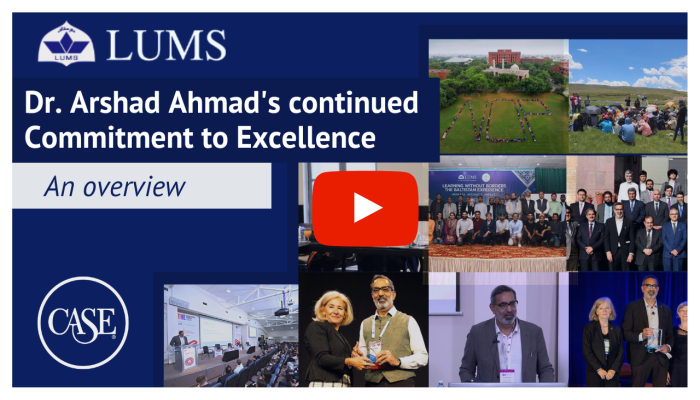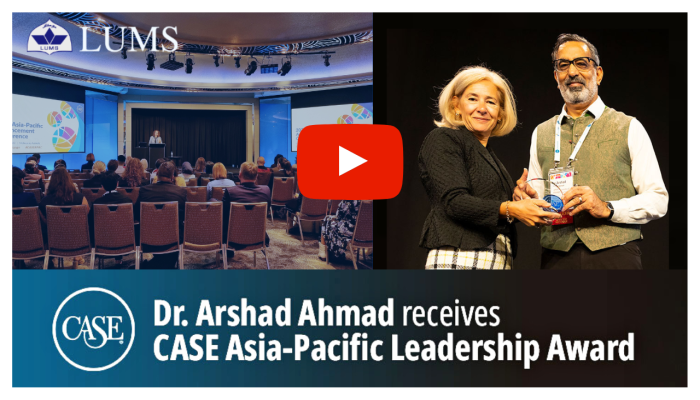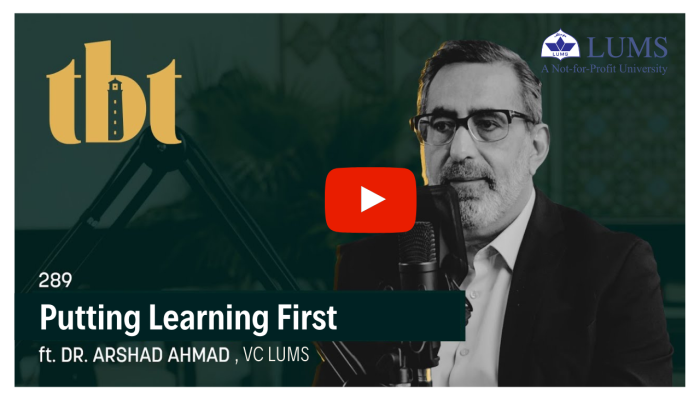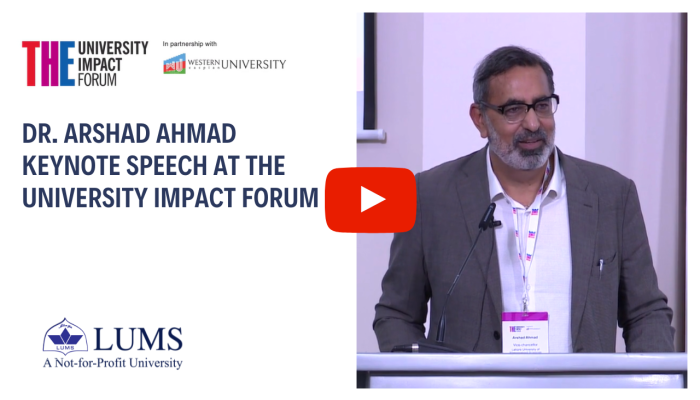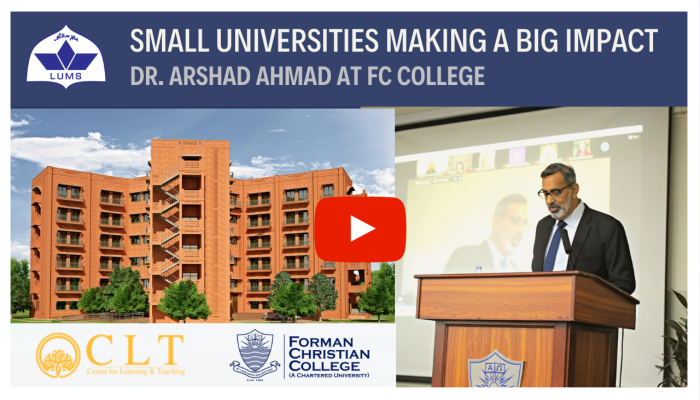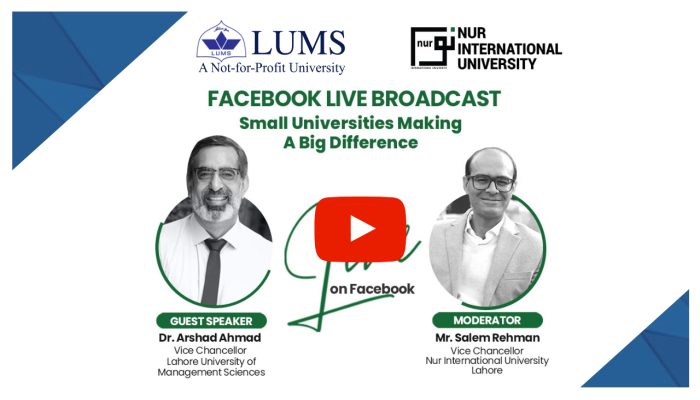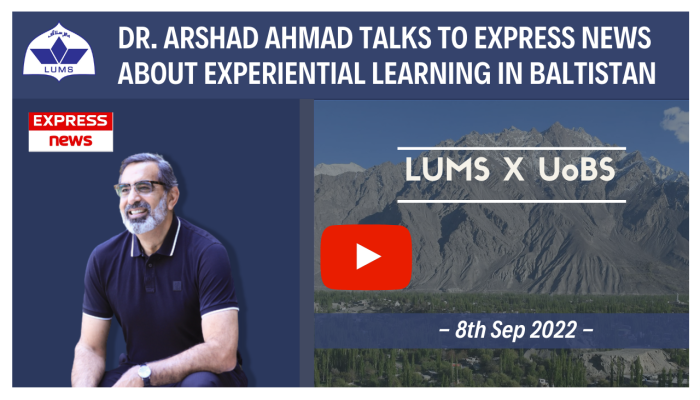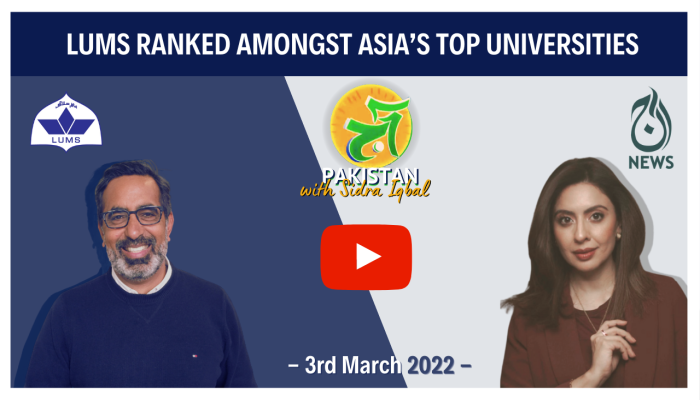Talks and Interviews
Keep up-to-date with Vice Chancellor Dr. Ali Cheema by reading his speeches and watching his latest interviews.
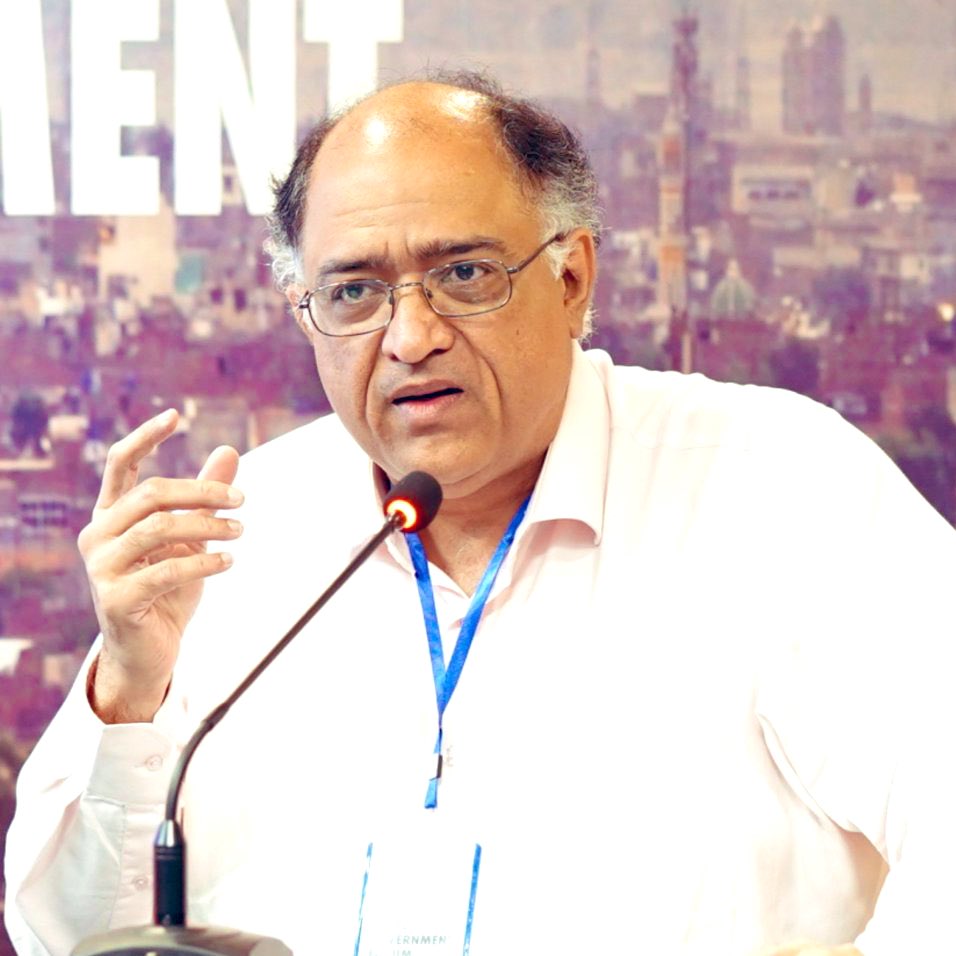
- CASE Asia-Pacific Leadership AwardMay 23, 2023CASE Asia-Pacific Leadership Award
- Building Higher Education InstitutionsDecember 13, 2022Building Higher Education Institutions
AoA, greetings, good morning, and welcome everyone!
We are delighted to have the Oxford Pakistan Programme at LUMS to discuss Building Higher Education Institutions for the 21st Century.
Thank you very much panelists – founding Pro-Chancellor Syed Babar Ali Sb, Principal Brown, Professor Blyth, Professor Bari, Professor Malik and the world’s youngest Nobel Laureate, Malala Yousufzai.
Malala, it’s great to see you in person, and I’d like to thank you again for your inspirational commencement address during our convocation in 2020. You’ll be happy to know that the during the lockdown in June, that commencement was internationally recognized with a circle of excellence award. Thank you!
I often ponder on a quote from the futurist H.G. Wells who said in 1920, that “Human history has become more and more a race between education and catastrophe.”In this race, the world currently faces a range of crises that increasingly manifest themselves in catastrophic ways. Grand challenges in health, scarcity, war, inequity, and climate change persist. Historically, these crises have been associated mostly with the Global South, but such threats to civilization cannot be viewed in isolation. In this race, we must elevate our roles.
What if we embraced our central mission as global educators who always put learning first? What if we expanded our perspective on learning? Could exceptional learning make the crucial difference to our planet and in our way of life?
For example, the pandemic forced us to put learning first. And some countries learned better than others. Here at LUMS, we champion a perspective we call learning without borders. We have come to believe that learning without borders offers a paradigm shift in how we can think about learning. Learning without borders can catalyze the types of frame-breaking innovations that the wider global community mostly needs. It invites leaders worldwide to explore how they too might accelerate exceptional higher-level learning.
As educators, in our roles as students, teachers, managers, or societal leaders, transforming challenges into opportunities requires breaking boundaries that limit our thinking and restrict what is possible. Learning without borders offers a way forward to transcend geographic, socio-economic, sectorial, gender-based, and disciplinary boundaries. This perspective allows us to think differently about how we structure the underlying systems that support exceptional, higher-level learning. To design these systems, we must unequivocally place learning first in our governance, in our leadership, and in our decision-making.
Today. as you explore how to create positive change to build higher education institutions in the 21st century, I’d like to briefly talk about 3 levers of learning. The key in all 3 levers are local solutions that turn obstacles into opportunities.
The first lever is access.
Let me share 2 examples.
To advance our efforts toward equity for women, we initiated The Women’s Scholarship Program which offers a 50-percent tuition waiver to all women accepted across 7 graduate programs in our business school. The international accreditation body AACSB recognized LUMS for becoming the first university in the world to create such a transformative social impact by advancing women’s access to management education. After just two years, the ratio of women in all business-school programs has quadrupled from 9% to more than 36%.
Another example is our flagship National Outreach Program (or NOP) that began 21 years ago. Each year, thousands of talented students apply to LUMS from over 140 towns and villages across Pakistan.
NOP students represent a tenth of our intake with students coming from family incomes of just $200 per month and where higher education would be inconceivable. Recently the Council for the Advancement and Support of Education, recognized the NOP as a model for organizations and universities worldwide. They awarded us with a global Platinum Award for best practices in diversity, equity, and inclusion.
We have seen the ripple effect that comes from investing in our highly talented, yet under-served, youth population. NOP students go on to top universities and companies, startup social enterprises and participate in Pakistani civil service, which many describe as the "wheels on which the entire engine of the state has to move." This year, more than 17,000 applicants wrote the national Civil Superior Service exams facing a miniscule 2% pass rate. The top three successful candidates were from LUMS, with first place awarded to an NOP student.
The second lever of putting learning first is relevance.
Soon, we will be co-locating 6 centers of excellence in a new, state of the art, central building complex, designed to encourage collaborative projects with industry. The 6 centers will focus on entrepreneurship, energy, gender, policy, technology, and water.
Here's an example of one Centre’s short-term impact.
4 years ago, The LUMS Energy Institute was seeded with Rs 30million (or about $250,000). Since then, it has raised 11 times that amount in grants and created the biggest power sector database in the country. The Institute has also designed Pakistan’s national policy on electric vehicles, jumpstarted 6 spinoff companies with significant equity, and produced prototype, affordable, electric rickshaws using swappable battery technology.
In a presentation to the LUMS Board of Trustees earlier this week, the director shared the Institute’s recommendations which saved Pakistan over $250 billion. If the institute’s current recommendations are implemented, another $750 billion can be saved in the coming years. This is a conservative estimate.
So, each center will open new doors of possibility for positive change.
The third lever is collaboration.
There are enormous opportunities in Pakistan for an infinite variety of effective local, regional, and global collaborations. Effective collaborations amplify positive change especially when they are driven by exceptional learning.
Recently, 150 of our students twinned with 150 students from the University of Baltistan in Skardu. Focusing on major challenges that have both local and global ramifications, faculty from the two universities co-designed and co-taught five immersive, experiential, field-based courses. These courses on hydrology, energy, life sciences, entrepreneurship, and e-commerce took place in natural learning environments in the majestic setting of our northern areas. Often described as the third pole, over a billion people rely on rivers that flow from this mountainous area.After living together for a month in Skardu, beyond the courses you can imagine how learning flourished though friendships and a deep appreciation of language, culture and resilience that defines our Balti counterparts.
In conclusion, the levers of access, relevance and collaboration, have something in common. All are anchored on values, since learning itself is guided by values.
Merit and high standards define us. Honesty and integrity are foundational.And diversity, equity, and inclusion strengthen us as a community.
I think effective 21st century organizations are those who ensure that our successors will become better than us, and will Insha’Allah take access, relevance, and collaboration to new levels.
We also believe that we can win the race for education by making exceptional learning our guidepost.
With that, there is so much more to learn from you. Thanks again for being here with us.
Thank you.
- THE University Impact Forum 2022September 1, 2022THE University Impact Forum 2022
Salams and Greetings everyone!
I’m really delighted to be here this morning!
Thank you Rector Baghirov and our Kaspi hosts, as well as Phil Baty and Times Higher Education, who have brought us together in this wonderful impact forum.
SDG 4 asks us to focus on quality for a better future – a more sustainable future, which is an excellent theme for today’s event. We need to think carefully, about how quality is reflected in our priorities, and how we can rapidly turn challenges into opportunities.
This morning, I’d like to explore “How Small Universities Are Able to Make a Big Difference in Quality and Sustainability.”
At LUMS where I the privilege of working for a 5th year, our institution was ranked as the 50th best small university in the world by Times Higher Education. This gives us a lot of hope. We are classified as “small” because we have about 5,000 students. We also have over 40 mission-driven programs across 5 Schools, with more than 300 top-class faculty, and over 17,000 alumni around the world.
But how can small universities, make a big difference? Before giving you concrete examples of high-impact initiatives, I’d like to introduce a paradigm-shifting perspective that is taking our university forward. That perspective puts quality first. It puts learning first. And above all, it puts collaboration ahead of competition.
That guiding perspective is also our slogan, and is summarized in just 3 words:
We call it: Learning without BordersFor us, Learning Without Borders means we cross disciplinary and geographic boundaries to get important work done. It means bridging the gender divide, and socio-economic barriers to harness talent to amplify our efforts.
Learning without Borders also means a singular focus on innovation that changes lives for a better world. Through Learning Without Borders, we think the key lies in how we can drive and sustain innovation.
In the interest of time, I will explore three drivers that are working for us. First, I want to speak briefly about the importance of merit. Second, we see multi-disciplinary Centres as the next stage of university governance to tackle existential threats facing us, including climate change. And third, a radical approach to diversity has become a great source of our institutional strength.
So, this morning I will speak about merit, disciplinarity and diversity.
First, let’s briefly look at merit.
At LUMS, merit defines student admissions, just as it sets the bar for faculty hiring and career progression. And equally important, merit drives resource allocation – that is, linking high quality metrics to all aspects of the budgeting process. We encourage each other to think of merit and quality interchangeably in everything we do. At a national level, we have seen high merit standards produce innovations that have raised the bar of quality for the rest of the country. For example, in 1996, LUMS introduced a 4-year bachelors’ degree when all other universities in Pakistan were awarding 2-year degrees. And 6 years later, that became the norm. More recently, we introduced LUMS 100, the first required course all students must take. In the LUMS 100 course, 12 of our top award-winning-teachers give TED-Style lectures on big questions across disciplines to all incoming students.
These master teachers talk about big questions in science and engineering; in business and society; and deliver insights on issues the humanities, law and education are confronting – insights that provide a glimpse into the academic disciplines.
Teachers also identify challenges facing our communities and invite students to make connections across disciplinary borders. The idea is to connect the curriculum so that students are better prepared to turn challenges into opportunities.
Second, we have elevated a handful of multi-disciplinary Centres to address grand challenges facing us. These challenges are amplified in developing countries, but they are universal.
Our Centres have chosen 6 challenges that face Pakistan. They include how our Centres can better manage issues related to energy and water, progressive policy frameworks, gender inequity, and using technology and entrepreneurship to make for a more resilient society.
Someone once said that wise leaders and successful entrepreneurs understand there is little difference between obstacle and opportunity and can turn both to their advantage.
These challenges also speak to today’s conference theme.
For example, the LUMS Energy Institute designed Pakistan’s Electric Vehicle Policy. Collaborating with industry partners in Korea and the US, we have launched several spin-off companies that are producing low-cost Electric Rickshaws that use swappable batteries. Installing swap stations at petrol stations eliminate hours required for conventional battery recharging. Similarly, e-motorcycles stand to revolutionize the current Pakistani market, the 5th largest in the world, where over 7,500 motorcycles are sold each day. In the power sector, recommendations from The Energy Institute have the federal government saving $1 billion each year for the next ten years.
Another example are data-driven interventions in smart agriculture coming out of the Water Informatics Center.
Here, a team of bioengineers, economists, computer scientists, hydrologists, and economists, asked to use a plot of land behind the cricket filed on our campus to experiment with regenerative agriculture. The experiment was aimed to benefit small farmers in developing countries by cultivating wheat and rice without tilling. By using raised beds covered with biological waste as mulch, after two seasons, the team significantly reduced input costs, eliminating pesticides and chemical fertilizers, and used only a third of the water used in conventional farming.
This is a promising intervention that we hope to scale in partnership with industry.
From an ecological and international business perspective, such approaches create prototypes for value-added green interventions that can be used for earning carbon credits and adapting to climate change.
Overall, by collaborating with industry, scalable, indigenous solutions can benefit millions in emerging markets like Pakistan. By collaborating with your university and industry partners, our South and Central Asian neighbors can showcase innovative solutions to farming.
Let me share one more example of collaboration with the University of Baltistan, in Skardu, located in the northern Pakistan. Over 200 million people live in the Himalayan region and about 2 billion people rely on the rivers that flow from this mountainous area. This cryosphere, or frozen mass, is known as a Third Pole, after the North and South Poles.
Last July, faculty from both institutions designed and co-taught 5 field-based courses on hydrology, energy, life science, entrepreneurship, and e-commerce.
150 of our students twinned with 150 students in Skardu and lived together for a month. A wealth of data is now feeding into research questions that has a direct impact on local communities.
In the Life Science course, over a hundred indigenous plants were tagged by students in one of the largest plateaus known as the Deosai plains. A lot of these plants are used for medicinal purposes and others that were thought to be extinct.
We also had promising results from local ice-grafting efforts that is proving to reverse glacial melting and flooding. Ice grafting is a method to bring together what locals identify as male and female glaciers that reverse melting.
If scaled, the impact is infinite. And here, partnerships with western universities open new doors for research and think tanks.
The students taking the energy course, saw first-hand what it means to live in conditions when there is load shedding for 12 hours each day. Imagine living with no power for half of each day, every day.
I was taken by a simple low-cost intervention that is now keeping the only medical operating theatre in Skardu powered 24/7 so that surgeries can be performed without interruption.
Finally, let me share a few examples that promote diversity and access which have a huge impact in young countries like Azerbaijan and Pakistan.
To support and give access to the ‘best and brightest’ is mission central to all of us.
21 years ago, we introduced The National Outreach Program (or NOP) as a flagship initiative targeting students from disadvantaged backgrounds whose families earn on average Rs. 40,000 or $175 each month.
Last year, CASE – a global NGO, awarded their Platinum Award for Equity, Diversity, and Inclusion to the NOP. They said:
“The NOP’s ability to identify talent from 140 towns and villages across Pakistan is impressive. We appreciated the varied layers of diversity, and its sustainability could be a model for universities globally, if similar investments were committed.” Unquote.
That investment today means raising about a billion rupees or $4 million annually through philanthropy.
For us, a private university, that investment not only supports disadvantaged students, but also a third of all LUMS students who receive financial support.
And each rupee has been worth raising! We found that NOP students tend to return to their villages to improve the lives of others.
Similarly, one particular gender diversity initiative in our School of Business was featured by AACSB, which accredits fewer than 5% of business schools globally. AACSB recently said:
“The LUMS Business School’s Women’s Scholarship is the first in the world to extend a 50-percent tuition waiver to any woman accepted to its graduate programs, advancing women’s access to higher education and creating transformative social impact”. Unquote
In practical terms, the impact of the 50% tuition waiver has been huge. After just the first two years, the ratio of women in all business-school programs has quadrupled to over 35%. Access and diversity have therefore become central to how we enact a Learning without Borders perspective at LUMS.
In summary, small universities like LUMS are likely to have very different trajectories of growth than larger institutions.
We hope that Learning Without Borders resonates with your philosophy, that puts merit first, that aims to integrate the disciplines, and focuses on diversity and access.
This is one of many ways we can demonstrate how leadership and innovation can serve as a model for collaboration.
I’ll end with my favorite quote from author and futurist H.G.Wells who in 1920 said: “Human history becomes more and more a race between education and catastrophe. Yet clumsily, or smoothly, the world it seems, progresses….”.
Ladies and gentlemen, I think all of us believe we can win that race.
Thank you!
- Convocation Speech 2022July 28, 2022Convocation Speech 2022
Honourable Pro-Chancellor Razak Dawood Sb, Rector Shahid Hussain Sb and our keynote speaker Justice Nasira Iqbal, respected members of the Board of Trustees, our distinguished faculty and staff, proud parents, family, and friends, and our remarkable graduating Class of 2022!
AoA and welcome everyone! I offer my sincere congratulations to each one of you!
Graduates, together with family and friends, we are celebrating your accomplishments today. There are many people who have played a key role in your success. Think of the teachers who helped you to learn, staff who served you when you needed them, and your friends. Join me in showing our appreciation for everyone who put your learning first. Let’s applaud your supporters who believe in you and your education.
Today’s commencement is a culmination of the journey that brought you here and a celebration of a new adventure that is about to unfold. It is a milestone event and certainly a defining moment for all of you. The world outside LUMS is an uncertain world. It’s a more challenging world.
The recent conflict in Ukraine has triggered food scarcity. Fuel and commodity prices are spiraling out of control and there is talk of a global recession. We in Pakistan are especially vulnerable to the increasing political uncertainty, trade deficits and unsustainable debt loads. These are hampering our ability to confront our own ongoing challenges in health and education. It’s easy to think that our country is heading downhill fast.
It is also easy to allow ourselves to be defined by these challenges and focus solely on the “what”. Instead, we have to try and address the “why” and discover our own roles to serve a greater purpose. And when our purpose becomes clear, we can inspire others to counter negative rhetoric and instead, our roles must be for positive change. This is a moment in time when we must strengthen our collective hope for a better Pakistan.
Our optimism requires changemakers like you, whose purpose is focussed on growth and development. History reminds us that when a new generation is guided by values we cherish and causes bigger than our individual concerns, the challenges turn into opportunities. Graduates, together we navigated and defeated so many disruptions during the pandemic.
If LUMS was a dress rehersal for life, its time for you to decide how you will lead. We look to your generation to find solutions, one day at a time, to realize our nation’s potential. Your education at LUMS will inshallah propel you to uncover solutions that will allow Pakistan and our broader world to flourish.
Graduates, whatever you imagine for a better world can become real.
When millions of people around the world visited the Pakistan Pavilion during Expo 2020 in Dubai, they saw a country with untold hidden treasures. Our lands come from one of the 7 great cradles of civilization. Our heritage is 8,000 years old. Yet, we are one of the youngest countries in the world. We have huge, untapped markets and low labor costs. Our youth is eager to learn. These factors can usher an era of explosive growth opportunities for Pakistan if we are willing to change our mindsets.
Pakistan’s pavilion at the Dubai Expo was one of the most visited. It earned the 2nd prize amongst 182 countries. In the words of our Pro-Chancellor, Mr. Abdul Razak Dawood who drove this project, I quote:
“We showed the world that Pakistan is a hidden treasure. It has been shaped by a mosaic of culture, craft and traditions that are magical. This is a progressive Pakistan, a tolerant Pakistan, a beautiful Pakistan. It is a land of opportunity for smart agriculture, a land of opportunity for educational technology, and a land for the young to shape”.
Graduates, you are in a unique position to find solutions to many issues our society faces every day. Focus your effort on doing what you can every single day to improve your lives and the lives of those around. These small steps can go a long way to make Pakistan a better place.
Graduates, you come from all areas of Pakistan. Many of you have earned merit and NOP scholarships, others are about to receive various academic accolades and distinctions. Most important, all of you have got the job done. And we congratulate all of you!
If you haven’t heard, there were over 14,000 students who wrote the Civil Service exam last year. The first, second and third places went to LUMS students. The top position was secured by Hafiz Naeem Ali Sheikh, the first NOP student to achieve this amazing result. You have demonstrated what transformational education means and have given LUMS global recognition.
Your graduation year marks our 35th anniversary. With over 30,000 unviersities globally, for the first time, the UK’s Times Higher Education has ranked LUMS as the 50th best small university in the world. The intrinsic value of your credentials is predicated on our reputation and our standing amongst our peers. As LUMS ambassadors, and soon, as our alumni, you are the future of this university. Your individual success and our collective accomplishments are intertwined.
In addition, I am proud to share that during this past year, LUMS has truly announced its arrival on the global stage. After competing with thousands of entries, in your graduation year, your university won several prestigious international competitions. For Example, the Council for Advancement & Support for Education, a global NGO, named our NOP Program the recipient of the Platinum Award for accessibility, diversity, and inclusivity. They said:
“The NOP’s ability to identify talent from 140 towns and villages across Pakistan could be a model for universities globally, if similar investments were committed.”
You also know LUMS faculty are the best in the country and compete with the best in the world. 2 weeks ago, Dr. Momin Uppal was selected as the top University Teacher in Physical Science & Engineering across all universites in Pakistan. His achievement complements his university-wide recognition as winner of The VC Teaching Excellence Award. He is also one of the few in the country to have won the national grand challenge research grant with a truly interdisciplinary focus.
When faculty work together more magic happens. Recently, Dr Nadhra Khan from History and Dr Murtaza Taj from Computer Science, were awarded first prize among 500 hundred Asian entrants. They won in the category of Excellence & Innovation in the Arts announced at a recent Times Higher Education International Conference in Nagoya, Japan.
AACSB which has accredited only 5% of business schools globally including SDSB –said the following about our Womens Scholarship Program:
“This Scholarship is the first in the world to extend a 50-percent tuition waiver to any woman accepted, advancing women’s access and creating transformative social impact”.
Out of 1,399 graduating today, 45% are female, and we look to you as role models and leaders who will inspire others, including the best of our men to take this generation to new heights.
Graduates, you are at a crossroads in your life. As you embark onto the next phase, I encourage you to be optimistic. You have all the skills, tools and attributes for success. These will propel you forward and bring success to you and to Pakistan.
Your predecessors have already paved the path for you. Historically, over 95% of LUMS graduates find employment within months following convocation, which is a glowing testament to the rigor of LUMS curriculum and speaks to the value of your credentials.
As you go into the world, today, know that employers value most, a strong work ethic – something that has been encouraged during your years at LUMS. They want people who demonstrate integrity – something which we hope to have instilled in you as well. Punctuality and respect, patience and empathy – these are timeless and will always serve you well.
But the world need more than essential good habits. Employers also want you to get things done. They want you to be able to think on your feet and problem-solve. Albert Einstein once said, “We cannot solve problems with the same level of thinking that created them.”
Whether you decide to work as part of a large and established organization, create or join a start-up, or choose to engage in civic activism, I want to share my sincere hopes for all of you. I hope that you will build better cultures of quality.
Steve Jobs once said, “Be a yardstick of quality. Some people aren’t used to an environment where excellence is expected.”
Quality shines not only through the knowledge you pursue, but also in the company you keep, in the ways you help others, and in the character you build. I hope that you will walk out into the world and make Quality your hallmark!
Graduates, you are leaving here as highly educated citizens who are destined to play a pivotal role in shaping the future. I urge you to embrace your full potential and work for the greater good.
Thank You and congratulations once again to the graduating class of 2022!

